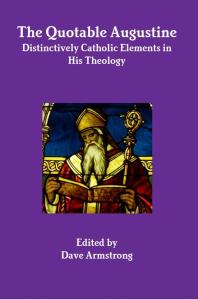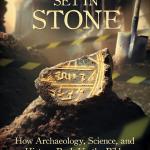Dr. Gavin Ortlund is a Reformed Baptist author, speaker, pastor, scholar, and apologist for the Christian faith. He has a Ph.D. from Fuller Theological Seminary in historical theology, and an M.Div from Covenant Theological Seminary. Gavin is the author of seven books as well as numerous academic and popular articles. For a list of publications, see his CV. He runs the very popular YouTube channel Truth Unites, which seeks to provide an “irenic” voice on theology, apologetics, and the Christian life. See also his website, Truth Unites and his blog.
In my opinion, he is currently the best and most influential popular-level Protestant apologist, who (especially) interacts with and offers thoughtful critiques of Catholic positions, from a refreshing ecumenical (not anti-Catholic), but nevertheless solidly Protestant perspective. That’s what I want to interact with, so I have done many replies to Gavin and will continue to do so. His words will be in blue. I use RSV for all Bible passages unless otherwise specified.
All of my replies to Gavin are collected in one place on my Calvinism & General Protestantism web page, near the top in the section, “Replies to Reformed Baptist Gavin Ortlund.”
This is my 19th reply to his material.
*****
This is a response to portions in Gavin’s video, “Response to George Farmer and Allie Beth Stuckey on Catholicism Vs. Protestantism” (5-8-23)
4:07 the whole appeal of Protestantism was a return and retrieval of practices of the early church.
4:18 I often recommend some of these classical treatments of Protestantism, like John Jewell and the Anglican tradition, Martin Chemnitz in the Lutheran tradition, Francis Turretin in the Reformed tradition. All of them are arguing from the church fathers. Here’s how [John] Calvin again put it in a 1539 dispute he had with a Catholic theologian [probably Cardinal Sadoleto]:
Our agreement with antiquity is far greater than yours, but all that we have attempted has been to renew the ancient form of the church that existed in the age of Chrysostom and Basil among the Greeks and of Cyprian, Ambrose, and Augustine among the Latins.
Pause the video and read that quote ten times. It’s an astonishing claim. What he’s saying is all Protestantism is, is a return to the third, fourth, fifth centuries.
That’s the “Protestant myth of Church history” that I’ve refuted — with tons of facts — times without number. Protestantism says that its two “pillars” are sola Scriptura (“Scripture alone” as the final and infallible authority in Christianity) and sola fide (“faith alone” as the way of being saved and extrinsic, imputed justification).
Let’s look at the second thing first. Did Protestantism simply revive or retrieve what was believed and practiced in the early Church? No. I call as my witnesses, Protestant scholars Alister McGrath and Norman Geisler. I cite both from books where they defend Protestantism over Catholicism. They have no gripe against their own views and obviously can’t be accused of bias. So what do they say about this topic? First, the late great Norman Geisler:
For Augustine, justification included both the beginnings of one’s righteousness before God and its subsequent perfection — the event and the process. What later became the Reformation concept of ‘sanctification’ then is effectively subsumed under the aegis of justification. Although he believed that God initiated the salvation process, it is incorrect to say that Augustine held to the concept of ‘forensic’ justification. This understanding of justification is a later development of the Reformation . . .
Before Luther, the standard Augustinian position on justification stressed intrinsic justification. Intrinsic justification argues that the believer is made righteous by God’s grace, as compared to extrinsic justification, by which a sinner is forensically declared righteous (at best, a subterranean strain in pre-Reformation Christendom). With Luther the situation changed dramatically . . .
. . . one can be saved without believing that imputed righteousness (or forensic justification) is an essential part of the true gospel. Otherwise, few people were saved between the time of the apostle Paul and the Reformation, since scarcely anyone taught imputed righteousness (or forensic justification) during that period! . . . . . (Roman Catholics and Evangelicals: Agreements and Differences, with Ralph E. MacKenzie, Grand Rapids, Michigan: Baker Book House, 1995, 502, 85, 222)
This spectacularly confirms that sola fide was a novelty and corruption (I don’t see how it can even be a “later development” as Geisler described it), and that infused, intrinsic justification was the ongoing tradition, and that of St. Augustine, supposedly the great forerunner of Luther’s “faith alone.” If there is any “development” of Augustine’s and the Church fathers’ well-nigh unanimous view, it is in Catholicism, since imputed justification was a late-arriving doctrinal novelty of the 16th century. The renowned Protestant scholar Alister McGrath makes virtually the same point:
Whereas Augustine taught that the sinner is made righteous in justification, Melanchthon taught that he is counted as righteous or pronounced to be righteous. For Augustine, ‘justifying righteousness’ is imparted; for Melanchthon, it is imputed in the sense of being declared or pronounced to be righteous. Melanchthon drew a sharp distinction between the event of being declared righteous and the process of being made righteous, designating the former ‘justification’ and the latter ‘sanctification’ or ‘regeneration.’ For Augustine, these were simply different aspects of the same thing . . .
The importance of this development lies in the fact that it marks a complete break with the teaching of the church up to that point. From the time of Augustine onwards, justification had always been understood to refer to both the event of being declared righteous and the process of being made righteous. . . .
The Council of Trent . . . reaffirmed the views of Augustine on the nature of justification . . . the concept of forensic justification actually represents a development in Luther’s thought . . . .
Trent maintained the medieval tradition, stretching back to Augustine, which saw justification as comprising both an event and a process . . . (Reformation Thought: An Introduction, 2nd edition, Grand Rapids, Michigan: Baker Book House, 1993, 108-109, 115; my italics and bolding)
A “complete break” is simply not a consistent development of doctrine. Therefore, it can’t be said — i.e., if these men are to be believed — that sola fide brought back what was widely believed in the early period of Church history. It wasn’t taught then, and one need not merely take my word for it. Here we have two eminent Protestant scholars and apologists freely admitting that it wasn’t. They are simply recording the actual facts of the matter.
Thank you, Dr. Geisler and Dr. McGrath. You make my work as a Catholic apologist a lot easier: especially my analysis of the actual historical development of soteriology. Quotations like these save me literally days and days of work. Gavin likes to cite Catholic scholars who disagree with Catholic magisterial teaching. Very well, then, by the same token, I cite Protestant scholars who disagree with certain widespread “Protestant myths” of Church history. Goose and gander . . .
5:48 Protestants just try to be honest about the messiness of history, but they said — and this is the common claim — that on the main issues of dispute, certainly on a greater number of issues the church fathers supported the Protestant position.
Again, I have concentrated on the two pillars of the so-called Protestant “Reformation” (sola Scriptura and sola fide): the very things that Protestants believe are particularly important and crucial, and where they think they are considerably more biblical and “patristic” than Catholics. Let’s switch over to sola Scriptura now. I’ve written more about it — including two books [one / two] — than about any other topic, in my 4,500+ articles and 55 books. And I’ve done more patristic research about it than any other topic.
If we examine the fathers that John Calvin mentioned above, and what they thought about the issue of the rule of faith (the relationship of Bible, tradition, and the Church), we see that they did not believe in sola Scriptura at all. I’ve written about all of them in this respect:
St. John Chrysostom (d. 407) vs. Sola Scriptura as the Rule of Faith [8-1-03]
Chrysostom & Irenaeus: Sola Scripturists? (vs. David T. King) [4-20-07]
Highlight:
“So then, brethren, stand fast, and hold the traditions which ye were taught, whether by word, or by Epistle of ours.” Hence it is manifest, that they did not deliver all things by Epistle, but many things also unwritten, and in like manner both the one and the other are worthy of credit. Therefore let us think the tradition of the Church also worthy of credit. It is a tradition, seek no farther. (On Second Thessalonians, Homily IV)
**
Basil the Great (d. 379) vs. Sola Scriptura as the Rule of Faith [8-1-03]
Vs. James White #16: St. Basil Held to Sola Scriptura? [11-19-19]
Self-Interpreting Bible & Protestant Chaos (vs. Turretin): Including Documentation that St. Basil the Great — Contrary to Turretin’s Claim — Did Not Believe in Sola Scriptura [8-29-22]
Highlight:
[Y]ou should confess the faith put forth by our Fathers once assembled at Nicæa, that you should not omit any one of its propositions, but bear in mind that the three hundred and eighteen who met together without strife did not speak without the operation of the Holy Ghost, . . . (Letter No. 114 to Cyriacus, at Tarsus; NPNF2-8)
**
Cyprian (c. 210-258) vs. Sola Scriptura [12-23-21]
Highlights:
Peter, upon whom by the same Lord the Church had been built, . . . (Epistle 54: To Cornelius, 7)
After such things as these, moreover, they still dare — a false bishop having been appointed for them by, heretics— to set sail and to bear letters from schismatic and profane persons to the throne of Peter, and to the chief church whence priestly unity takes its source; and not to consider that these were the Romans whose faith was praised in the preaching of the apostle, to whom faithlessness could have no access. (Epistle 54: To Cornelius, 14)
**
St. Ambrose (c. 340-397) vs. Sola Scriptura [12-18-21]
Highlight:
He said to Peter:
I have prayed for you, that your faith fail not.Luke 22:32 To the same Apostle, again, when on a former occasion he said,You are the Christ, the Son of the living God,He made answer:You are Peter, and upon this Rock will I build My Church, and I will give you the keys of the kingdom of heaven.Matthew 16:18 Could He not, then, strengthen the faith of the man to whom, acting on His own authority, He gave the kingdom, whom He called the Rock, thereby declaring him to be the foundation of the Church? (Exposition of the Christian Faith, Bk. IV, chapter 5, section 57)
**
St. Augustine (d. 430) vs. Sola Scriptura as the Rule of Faith [8-1-03]
Augustine & Sola Scriptura (vs. Gavin Ortlund) [4-28-22]
Augustine & Sola Scriptura, Pt. 2 (vs. Gavin Ortlund) [4-29-22]
Highlights:
The authority of our books, which is confirmed by the agreement of so many nations, supported by a succession of apostles, bishops, and councils, is against you. (Against Faustus the Manichee, XIII, 5; cf. XI, 5; XIII, 16; XXXIII, 9)
My opinion therefore is, that wherever it is possible, all those things should be abolished without hesitation, which neither have warrant in Holy Scripture, nor are found to have been appointed by councils of bishops, nor are confirmed by the practice of the universal Church, . . . (Epistle 55 [19, 35] to Januarius [400] )
**
On my Fathers of the Church web page I have collected dozens of articles on the Church fathers’ rejection of sola Scriptura. See the section: “Bible / Tradition / Sola Scriptura / Perspicuity / Rule of Faith.” It’s easy to show that the Church fathers held an entirely “Catholic” view of the rule of faith. I cite three prominent Protestant Church historians, summing up the views of the Church fathers:
As regards the pre-Augustinian Church, there is in our time a striking convergence of scholarly opinion that Scripture and Tradition are for the early Church in no sense mutually exclusive: kerygma, Scripture and Tradition coincide entirely. The Church preaches the kerygma which is to be found in toto in written form in the canonical books.
The Tradition is not understood as an addition to the kerygma contained in Scripture but as the handing down of that same kerygma in living form: in other words everything is to be found in Scripture and at the same time everything is in the living Tradition.
It is in the living, visible Body of Christ, inspired and vivified by the operation of the Holy Spirit, that Scripture and Tradition coinhere . . . Both Scripture and Tradition issue from the same source: the Word of God, Revelation . . . Only within the Church can this kerygma be handed down undefiled . . . (Heiko Oberman, The Harvest of Medieval Theology, Grand Rapids, Michigan: Eerdmans, revised, 1967, 366-367)
It should be unnecessary to accumulate further evidence. Throughout the whole period Scripture and tradition ranked as complementary authorities, media different in form but coincident in content. To inquire which counted as superior or more ultimate is to pose the question in misleading terms. If Scripture was abundantly sufficient in principle, tradition was recognized as the surest clue to its interpretation, for in tradition the Church retained, as a legacy from the apostles which was embedded in all the organs of her institutional life, an unerring grasp of the real purport and meaning of the revelation to which Scripture and tradition alike bore witness. (J. N. D. Kelly, Early Christian Doctrines, San Francisco: Harper & Row, fifth revised edition, 1978, 47-48)
In the substance of its doctrine this apostolic tradition agrees with the holy scriptures, and though derived, as to its form, from the oral preaching of the apostles, is really, as to its contents, one and the same with those apostolic writings. In this view the apparent contradictions of the earlier fathers, in ascribing the highest authority to both scripture and tradition in matters of faith, resolve themselves. It is one and the same gospel which the apostles preached with their lips, and then laid down in their writings, and which the church faithfully hands down by word and writing from one generation to another. (Philip Schaff, History of the Christian Church, Vol. 2 [Grand Rapids, Michigan: Eerdmans, 1966, from the fifth revised edition of 1910], Chapter XII, section 139, “Catholic Tradition,” p. 528)
*
***
*
Practical Matters: Perhaps some of my 4,500+ free online articles (the most comprehensive “one-stop” Catholic apologetics site) or fifty-five books have helped you (by God’s grace) to decide to become Catholic or to return to the Church, or better understand some doctrines and why we believe them.
Or you may believe my work is worthy to support for the purpose of apologetics and evangelism in general. If so, please seriously consider a much-needed financial contribution. I’m always in need of more funds: especially monthly support. “The laborer is worthy of his wages” (1 Tim 5:18, NKJV). 1 December 2021 was my 20th anniversary as a full-time Catholic apologist, and February 2022 marked the 25th anniversary of my blog.
PayPal donations are the easiest: just send to my email address: [email protected]. Here’s also a second page to get to PayPal. You’ll see the term “Catholic Used Book Service”, which is my old side-business. To learn about the different methods of contributing (including Zelle), see my page: About Catholic Apologist Dave Armstrong / Donation Information. Thanks a million from the bottom of my heart!
*
***
Photo credit: my 2012 book (see info. and purchase information)
Summary: Gavin Ortlund claimed that Protestants are closer to early Church teachings. I cite five Protestant scholars who show that the fathers rejected Bible Alone & Faith Alone.














